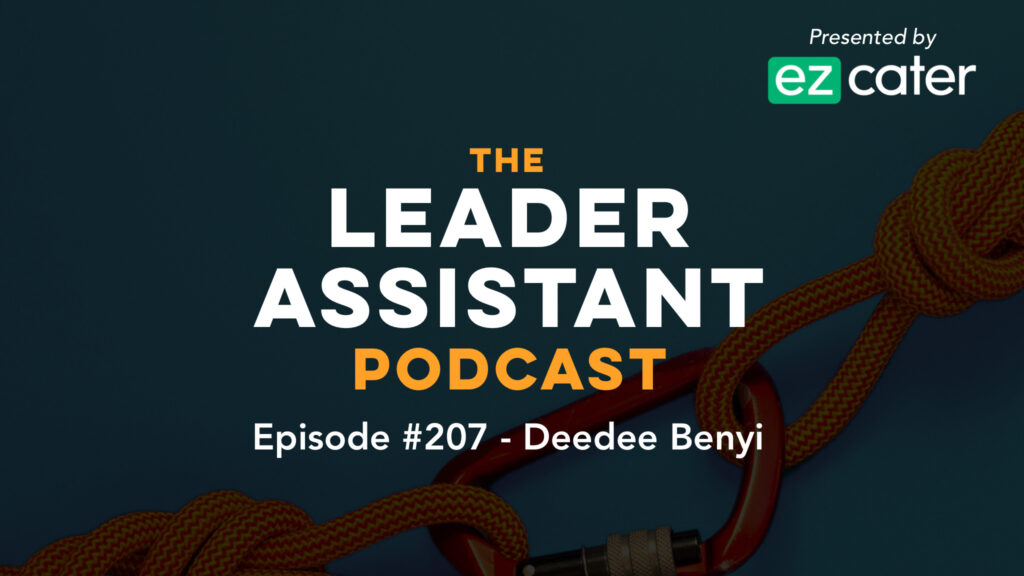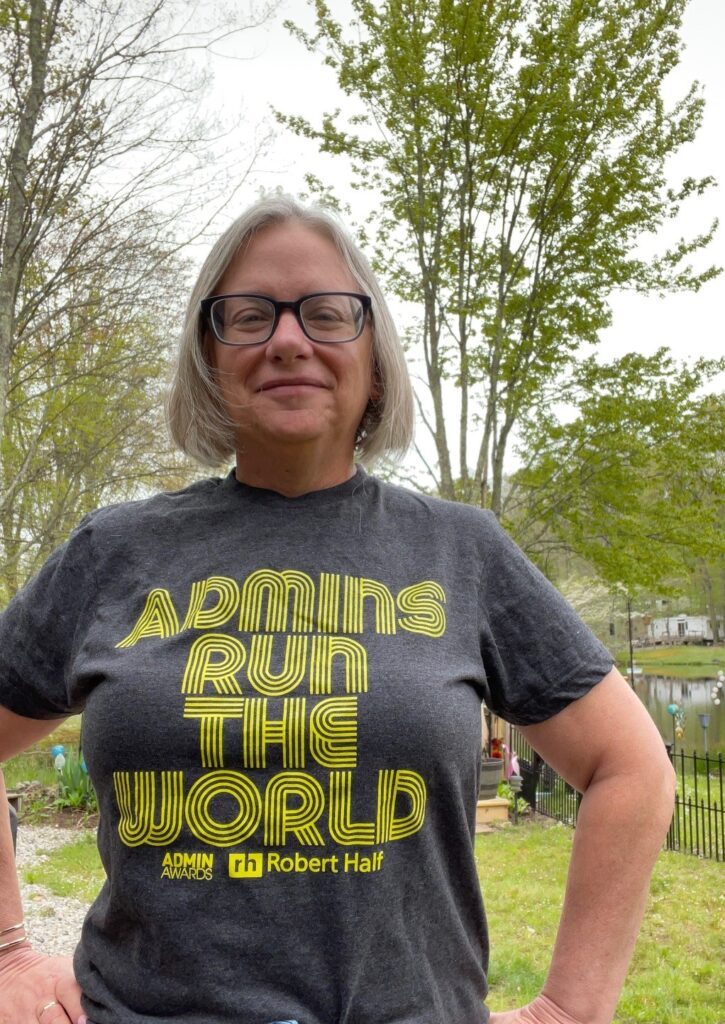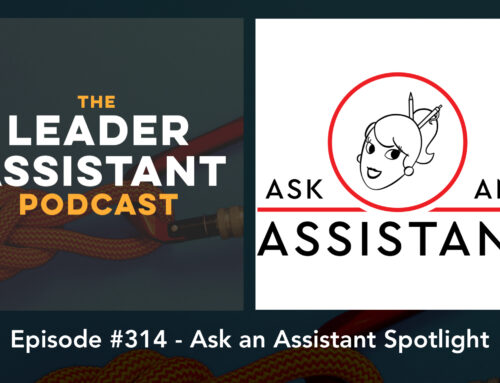Deedee Benyi is the Executive Assistant to the Chief Data Scientist at The Hartford. She came to this role after a varied career path including Automotive Service Management in addition to Real Estate and Vacation Planning in the USVI.
In this episode, Deedee talks about how to understand the business so you can better support your executive team, supporting multiple executives, creating a professional and personal brand, as well as championing the collective administrative professional brand.
Watch the short, animated #AssistantsLEAD video mentioned in this episode.
LEADERSHIP QUOTE
If your actions inspire others to dream more, learn more, do more and become more, you are a leader.
– John Quincy Adams
CONNECT WITH DEEDEE
ABOUT DEEDEE
Deedee Benyi is the Executive Assistant to the Chief Data Scientist at The Hartford. She came to this role after a varied career path including Automotive Service Management in addition to Real Estate and Vacation Planning in the USVI.
Deedee joined The Hartford in 2004 and has spent most of her tenure supporting claims leaders until her move to support the Chief Data Science Officer in 2019.
She has been a communications lead and chapter lead of an employee resource group, a featured company blogger and most recently, the co-founder of the Administrative Community of Practice.
Deedee and her husband live in Granby, CT with their 2 dogs and 2 cats. They enjoy traveling and spend their summers lakeside with their 40′ camper.
–––
THE LEADER ASSISTANT PODCAST IS PRESENTED BY EZCATER
ezCater is the nation’s most trusted provider of corporate food solutions — the best way for companies to order food for daily employee lunches, meetings, and events of any size or budget. ezCater’s simple-to-use platform provides a network of over 100,000 restaurants nationwide, business-grade reliability, food spend management tools, and 24/7 support from their highly trained customer service team.
To explore corporate food solutions or place a catering order, visit ezcater.com.
–––
THE LEADER ASSISTANT PREMIUM MEMBERSHIP
To learn more about how you can join growth-minded Leader Assistants, check out our Leader Assistant Premium Membership for ongoing training, coaching, and community.
THE LEADER ASSISTANT BOOK
Download the first 3 chapters of The Leader Assistant: Four Pillars of Game-Changing Assistant for FREE here or buy it on Amazon and listen to the audiobook on Audible. Also, check out the companion study guide, The Leader Assistant Workbook, to dig deeper.
LEADER ASSISTANT LIVE EVENTS
Check out our constantly updated schedule of events for admins and assistants at LeaderAssistantLive.com.
JOIN THE FREE COMMUNITY
Join the Leader Assistant Global Community for bonus content, job opportunities, and to network with other assistants who are committed to becoming leaders!
SUBSCRIBE
Subscribe to The Leader Assistant Podcast so you don’t miss new episodes!
You can find the show on Apple Podcasts, Spotify, Google Podcasts, Pandora, and Stitcher.
Join my email list here if you want to get an email when a new episode goes live.
LEAVE A REVIEW
If you’re enjoying the podcast, please take 2 minutes to rate and review the show on Apple Podcasts here. Each review helps me stay motivated to keep the show going!
—
EPISODE TRANSCRIPT
Deedee Benyi 0:00
Hello, I’m Deedee Benyi. And my leadership quote is If your actions inspire others to dream more, learn more, do more and become more you are a leader from John Quincy Adams.
Podcast Intro 0:18
The Leader Assistant Podcast exists to encourage and challenge assistants to become confident game changing leader assistants.
Jeremy Burrows 0:32
With so much on your plate, wouldn’t it be nice if ordering food for the office were easy and reliable. My friends at easy cater our workplace catering pros helping you find food for everything from daily employee meals to staff meetings and special events. With easy caterers network of over 100,000 restaurants nationwide, you’ll have a huge variety of options near you for any group size, dietary need or budget. Your food arrives on time as ordered all supported 24/7 by easy caters team of experts visit easycater.com/leaderassistant to find out more. Hey friends, welcome to The Leader Assistant Podcast. It’s your host Jeremy Burrows and you are listening to Episode 207. You can check out the show notes for this episode at leaderassistant.com/207 Leaderassistant.com/207 and today I am speaking with Deedee Benyi. Deedee how’s it going?
Deedee Benyi 1:38
It’s going great. Thanks for having me.
Jeremy Burrows 1:40
And what part of the world are you in?
Deedee Benyi 1:42
I’m in Connecticut.
Jeremy Burrows 1:45
Nice and tell us about where you work what your role is. And then we’ll kind of get a little bit of backstory as well.
Deedee Benyi 1:51
Sure. So I am an executive assistant. And I support a host of people. But my main support is for the Chief Data Science Officer at the Hartford. I joined the Hartford in 2004. So I’ve been here for cheese will be 18 years coming out. Thank you very much. But I really have been an Administrative Professional all my life.
Jeremy Burrows 2:17
Awesome. How did you get into that world?
Deedee Benyi 2:21
Well, it started when I was eight. And I was asked to be the secretary of my neighborhood club. Because I was the only girl in the neighborhood. So of course I was the Secretary and I used to take, I used to take minutes on my mother’s Portable typewriter in the woods. You know, I would like write down the club rules. So but I started in the administrative path. I went to college and I discovered the college wasn’t for me. And I came out and I got a job working at a car dealer. My sister knew someone she was like, Oh, you can get this job for a few months, drive a truck around. And then you can go back to school. And so about, I don’t know, three or four months into it. They were like, Hey, we need a part secretary. And I was like, I don’t know what that is. But okay. And that really just started my administrative career. I really always worked in some sort of administrative work. And that’s back in. Oh, well, I’m not sure if I should date myself. But that was back in 1987. And so really every role that I’ve had, I’ve been an administrative assistant, I’ve been an office manager. I was a branch office administrator for a national company. So I’ve really just always been an assistant and I think stemmed back to when I was in theater in high school as a theater. He and I was a stage manager all the time. At a stage manager and a sense when you look at it is an administrative professional. You sit through everything, you pay attention to everything and then the leader or the director walks away, and when the show the curtain goes up, it’s yours. So yeah, it’s just kind of always been my path. I had I’m not really sure how I chose it.
Jeremy Burrows 4:08
Okay, so when you’re in the woods, taking those minutes for the neighborhood club, what were some of the weird odd rules that you had to put down? Do you remember?
Deedee Benyi 4:16
Oh, so we had some really like we had the swimming club where you had to go to the public pool had to be four days a week. If you didn’t go for then you were out of the club. We had another club that it didn’t last long because no one would go by the rules but someone decided that we should have a stealing club where we would go to the local little store downtown and you have to steal one piece of again dating myself penny candy a week. We were like, I don’t know if I want to do that. But you know you want to be in a club. So we did have some silly rules. Most of them revolved around in the bike riding club, you had to ride your bike from one place To the other place at least once a week, nobody watched these rules. And I would type them up and we would hang them on this little pushpin that we had. And I got a tree in the woods. Like it wasn’t as if that lasted after the next rain. But I wrote him down. I was I was the dutiful minute taker back in when I was eight.
Jeremy Burrows 5:21
That’s awesome. That’s awesome. Yeah, I’m just thinking back to all of our clubs that we did with the neighbors. And we had the I think we did one where it was like, we found a dead bird. And we’re like investigating, you know, what killed the bird who killed the bird. And so it’s like, the bird investigator association or something like That’s awesome. We made that creative. We made like cardboard cameras and tape them up into the corner of our of our room and your fancy, yeah. Let’s, yeah, tell us tell us something about you. Personally. What’s your What are your favorite hobbies? Or do you have kids, cats, dogs, turtles all the above.
Deedee Benyi 6:08
We have cats and dogs, two dogs and two cats. If my husband had his way, we would have 200 dogs and 200 cats, but that won’t happen. I love to travel. Actually, before I walked into my office, I was like, I need to travel I need to go somewhere. And we are campers, which a lot of people look at me and go, you know, look like a camper. Well, I we’ve a 40 foot destination trailer. This is not a, you know, a tab that we keep on a seasonal campsite. And we absolutely love it is our second home in the summer. We’ve made amazing friends. And I think this is gonna be our 10th season. So that’s kind of my thing. I love to say that I’m creative. And I’m crafty. And I have all the tools. But I generally don’t use them. Yeah.
Jeremy Burrows 7:01
Awesome. Well, camper, 40 foot campers. I’m not a camper. So, but a 40 foot camper. Sounds more like my type of camping. Yeah, I
Deedee Benyi 7:12
mean, I have a fireplace. I have central air, you know? Oh, yeah. That’s, that’s the same size bed.
Jeremy Burrows 7:19
Nice. Nice. Yeah. Cool. Well, let’s talk a little bit about the mystery profession. And maybe can you share a little bit about understanding the business of the executive, the company that you work for the team that you work for? Even you know, I was thinking about your comment about being a stage manager and how like, when you’re a stage manager, you really have to listen and pay attention to what’s going on in the you know, quote, unquote, business. And so yeah, how is that translated to your career as an executive assistant? To the C suite? And how how have you? And how would you encourage those listening to learn and absorb all they can and practically speaking, just understand the business that they’re a part of?
Deedee Benyi 8:13
Yeah, so I think that’s so important for and it is for me, I know that other assistants don’t necessarily have the really big drive to be part of their department, per se, to be part of the business. And while I will never, in a million years be smart enough to be a data scientist, or creative enough, because, you know, I described data scientists as actuaries with a sense of humor. And so they’re just brilliant people, and they’re doing amazing things. And I’ll never be that. But so and then when I started supporting this later, in 2019, I said, Okay, I know, I will never understand, I’ll never be able to build a model in data science. But what I can do is understand how the work that my team does, supports the business. I took a lot of time to understand how we interact with our business customers and our customers or other departments within the company. And so for me, it was so important for me to understand what we do so that I could help my boss prioritize things. And to understand that when this meeting invite comes across, I can then say, I know this can wait, without having to go back to my leader and say, Hey, can I move this? I rarely asked him that question, because I know what’s critically important now. I know what the key initiatives are that he’s working on now. And I know the things that can wait. And I think that’s how I’ve kind of posed myself Since I really realized that I’m going to be an administrative professional for the, for all of my career, that’s the attack, the way I attack the job is understanding the work so that I can then understand how to best serve my legal.
Jeremy Burrows 10:18
What’s what’s maybe a practical tip on how you understand the work, like I was talking to assistant the other day, and they’re like, I don’t know anything about the financial world, and I’m an investment firm. And I’ve been here for four months, and, you know, help me I don’t, how do I learn? How do I understand the business when the business is
Deedee Benyi 10:37
right? That’s hard, but four months is still to tell them the four months is still early. Yeah. So what I did in this role, and the last role that I had before was, I set up one on ones with all of my leaders direct reports. And I said, I need you to walk me through the work you do. And I don’t, I don’t want you to fully sugarcoat it, right to bring it to my level of understanding. But I want you to talk about it. So I totally get what you do during the day. So that was important. I spent a lot of time on LinkedIn, going through my leaders, like the people they follow, looking where they’ve interacted, and then I started following some of those people. Right, those people who are writing articles, I, you know, there’s a gentleman who writes a lot about data, Randy been and I’m like, subscribe to his newsletters, I will read all of his things. And funny enough, I was getting ready to send my boss an article that I was like, this is important, he should read this. And I go into his email, and his boss had sent the same article to him. And I was like, Okay, I’m looking at the right stuff. So I think it’s just understanding that you are part of a business. And so you need to know the business. And it takes time, and it takes effort. It’s not something you can do during the day. I mean, this is like evening homework. Right? I spend most of my time on LinkedIn at night. Someone asked me today, like, what’s your favorite social? I was like LinkedIn. Yeah, like what? Like, yeah, it’s just, for me, it’s a way for me to connect with my leaders. And let my leaders know that I’m doing what I can to support them by learning more about what we do.
Jeremy Burrows 12:36
Well said about it. So, Didi, let’s talk about the collective administered professional career. And, you know, when I sync up with people, such as yourself to have him on the show, I asked, Hey, what are some topics that you would like to talk about on the show? And one of them is you’d like one of the talks about the administrative collective. And I want you to just kind of go all in on this and tell me, tell me what you mean by that, and what you’re passionate about as it relates to that, and then how those listening can embrace that that mindset.
Deedee Benyi 13:19
So last year, I was asked by one of our ELT assistants, if I would stand in for her speaking at a conference to talk about branding. And I was like, Yep, I could talk about branding all day long. But I wanted to kind of work in some more things into my branding presentation. And so I started doing research
Jeremy Burrows 13:42
for just a second ad. Absolutely. What What do you mean by branding? Give us kind of a short because branding can mean different, different things in different settings.
Deedee Benyi 13:52
Right, so my subject was furthering your professional brand. Alright, so we all have a brand, whether we think we do or not. And so that’s kind of where I started is saying, Listen, if you haven’t created a brand, someone has created it for you. So you need to you need to create your own brand. And you need to be vulnerable with yourself to think about where you’re great and where you’re not great. And you need to get feedback from people about those great, not great things. And you need to find a way to share those great things, improve the not so great things. And then I started talking about some practical things like your LinkedIn presence, like how you outwardly present yourself. And that got me thinking about the admit the administrative branch, because we all know and, you know, chapter 19 of your book. We know that there’s a lot of people out there who think that we have little to no value. We know that there’s a lot of people that think we literally make coffee and, you know, shuffle papers around and file folders. And so I just started thinking, gosh, we don’t talk about and I didn’t even do it in my own personal brand. There was nothing that worked on enhancing the product of the whole administrative professional brand. And what was I doing? How was my brand reflective of what I think people should think about what we do. And I talked about it a little bit in the, the presentation that I did, and I said, remember that you should respect the collective, and ensure that your brand is representative of what you would like the world to know about what we do. And I said it was a smaller group, there’s a lot of people in line, there’s a small group, and I just looked out over the crowd. And everyone was like, huh, wow, like, ever thought of that. And I was like, I’m on to something. And so I came home and I just like started doodling like, what can I find out there about the collective branding for the administrative assistants and I found so then I started looking at collective branding for specific for other industries. And there is collective range of professional organizations like realtors, right, the National Association of Realtors, they work really hard on enhancing the brand of the profession. Well, no, I don’t expect them to be there to be at the National Association of Administrative Professionals, where you have to be a member to have the credibility, I don’t expect that to be there. So when I didn’t find anything, I started digging deeper into other areas of thought. And what I found was that there was nothing out there. And that there were some people that talked about it here and there, right, like, so you have the dehumanizing chapter in your book. There’s not just an admin.com, right, that’s out there. There’s there are places but most of them are focused on the person and not the profession. And then I had these glorious ideas. And I think you saw my posts, I had these amazing ideas, I was going to start this community, I was going to do the administrative collective, I was going to be the influencer in the space, I started working, I bought the domain, I set up groups, you know, and I hid them. So I’d be ready and life threw me a bunch of curveballs, last kind of month and a half. And I said, You know what, I don’t want to be an influence. I don’t want to run a community, I don’t want to. Um, and so I decided that I was just going to continue to talk about the collective with people, and hope that it starts to spread. So. But what I think is important, most important for individuals to recognize is that it’s our job. To further the collective brand. No one’s going to do it for us, there’s not going to be all of a sudden these, you know, articles in the New York Times talking about, hey, the Administrative Professionals awesome, and you all should respect them. But we have to be our own cheerleaders. Right, we need to let people know what we are. We need to let people know that there is you know, there are people out here who are doing things that aren’t just managing a calendar and booking travel, and handling expense reports and ordering supplies. And well if that’s all you do, and you’re damn good at it, that’s awesome. Right? That is awesome. But if you are strategic in how you work, if you are forward thinking for your leader, if you’re understanding the importance of the work that your team does, and how it affects the company, and maybe the customer then you’re you’re more than just that transactional. You’re the strategic and I think that there is a very small population of the world that knows that an administrative professional can be strategic. And my suggestions are that we incorporate our the greatness of our profession and everything that we do. Understanding that interactions can create someone’s judgment of the profession. Now listen, you’re not gonna be perfect in every single interaction. That just doesn’t happen, right? No one is perfect and there are are going to be times when someone asks you, that’s a question that has been asked 450 times, you’re sick of tired of answering it, and you’re going to be a little snippy. Right. But if we can make a concerted effort to tell people the value of our profession, if we can try and educate people every chance we get if we can absolutely get rid of get rid of the term, and I know people talk about this all the time, if anyone in the administrative profession says I’m just an admin, I’m just don’t like it. Because you’re never just an admin. If you think about the work that we do, everything we do is strategic. Even if you just handle those transactions, you’re still strategic, because you’re allowing your leader to be strategic, you’re allowing your leader to lead. So no matter what we do, there is a perception that we need to push forward, that we are strategic employees, strategic partners, that we are furthering the department, the business in the company, and we need to talk about it more and not be afraid.
Jeremy Burrows 21:24
Yeah, it’s interesting, because, you know, part of the reason I titled my book and my podcast, the leader, Assistant, not part of the view, pretty much the main reason I titled it that is because I wanted assistants to see themselves as leaders. Right. And I even talked about, you know, I’ve gotten great feedback on the book, but like, there’s been a couple of people they reached out, and I talked briefly in the book about how assistants should strive to be the best sales people for their organization. Oh, my gosh, yes. And like, you know, I had somebody reach out, I was like, this is, this is crazy. I am not a salesperson, that’s not my job and this or whatever. And I was like, I guess you’re not a leader, Assistant. But like, you know, it’s, it’s interesting how much I’ve probably had more assistance. And even a couple of assistant, quote, unquote, thought leaders, pushback on my kind of statements and my vision, then I have executives, or CEOs, or C suites, or business people push back, you know what I mean? And it’s like, they’re like, No, this is what I want, like, how do I get my assistant to believe this and to, to own this? And so anyway, I think that I think it’s great that, and I think that’s a good point, that it’s not just about your personal professional brand, and your role at your company, whatever. But everything you do, can actually impact the overall perception of the administrative, you know, profession, right? Well, what’s maybe your elevator pitch. So when somebody says you meet somebody at a, at a networking event, or in an elevator, and they’re like, Oh, what do you do? You know, I don’t know if you saw my 32nd animation video I made. But what’s your version of that kind of strategic administrative assistant executive assistants? If somebody says, What do you do?
Deedee Benyi 23:34
So mine’s probably very different than you think. Because if someone says, What do you do? I say, I’m an executive assistant. And I stopped. And they wait to see what they come back with. And some people are like, Oh, that’s cool. And that’s when I’ll jump in and go, actually, it’s one of the best rules I could possibly imagine. For me, I get to do this, this and this, and move on. Or sometimes they go, Oh, that’s, that’s good. You know, like, they don’t think much and I go, Hmm, so that’s an interesting view. Can you tell me why you think like that? And then I try and, you know, change their mind, but I’ve always been, I’m talking 100%. But when it comes to that question, I kind of want to see where people take it. Because I want to see what they think of the profession. Yeah. So it’s very dependent. And I will obviously talk about it and I say things like, I am a strategic business partner to my leader. I support a very large team. I provide direct support. Now I provide direct support for an SVP and five VPS. So I got my hands full there. But you don’t I’ll tell people I’m like I have one of the greatest jobs in being unable to help another person succeed. And I think people look at that differently what people don’t understand administrative support, they definitely have never thought of it that way. Yeah. Because my success is based on my leader success. And I’ve always been that way, when my now boss interviewed me, and he said, you know, what’s your goal? If you got this, this role, and I said, to get you to SVP. And he laughed, and he goes, Well, I don’t want that. And then two and a half years, he was promoted to SVP. And I laughed, and he’s like, Okay, you’re right. But that’s always been my goal is to let my leaders succeed, and make sure that they succeed, give them the tools to succeed.
Jeremy Burrows 25:53
So you mentioned you support multiple executives, what’s your number one tip for those listening that are supporting multiple executive?
Deedee Benyi 26:02
So my SVP is my number one priority. No matter what I’m doing, if he needs me, I will stop. And I will do everything for him. And it’s communicating that kind of hierarchy of support with the other leaders. Right. So I will, I had a new VP start this week, and we met on Tuesday. And I said, Listen, my number one goal is, and then the rest of my leaders, you included, are my then next goals. And then the entire department comes below that. And I, you know, I threw in that I’m also one of the leads of our administrative community of practice, I said, so that’s a priority as well. So understand that, if I’m not doing anything for for Paul, I can do whatever you need right now. But there are going to be times when I’m going to respond back to you and say, working on something, give me a few. Yeah. So it’s being able to communicate well, to let them know when you’re gonna get it done. And I don’t like saying, I’ll get to that next. I can be working on so it was gonna take three days. I’ll get to it next isn’t. Just be open about your capacity. Yeah. I pushed back to a leader this week. So I did this. And I said, I can’t do it this week. I can’t. And it’s hard to get to that point. I’m advanced in my career. I’m okay with telling people I can’t do. But I can tell I understand how people who are newer in their career were don’t have the same relationship that I have with my leaders are intimidated and would never in a million years say that and they’ll bury themselves. Because they don’t want to be the person that says no, yeah, saying no, or setting an expectation makes you look better than just beating yourself over the head to get all the work done.
Jeremy Burrows 28:11
How do you know, it makes a lot of sense when you have an executive that’s higher up the ladder than the other ones? How do you prioritize the ones though that are on the same level
Deedee Benyi 28:23
as things come? Okay, I’m a, I’m a zero inbox person. I’m a, if it comes in and goes out. I don’t like things hanging out, I don’t like to be like, I’ll do that later. I don’t ever put off what I can do right this second. And for me, that works really well. Because when I came into this role, I started obviously, with a blank slate, and I just kept at it. And when you get yourself to that blank slate, or you get yourself to inbox zero, or whatever, you’re able to take things as they come. And yes, there’s always those bigger projects that you you know, you put to the side when you’re doing these things as they come, but I don’t have the VPS that I support. Nobody gets better service than the others. I create them all equal. Now I’m sure when a couple of them are listening to this, they’re gonna be like, no, she totally treats me. And, you know, I want them to feel that way. But I think it’s just about also prioritizing how important it is if someone says, Hey, I need a one on one setup starting in February, every other month. And I’ve got three other requests. I’m going to go through the request. This is not critically important. So it’s not just taking work by the hierarchy. But taking work by it’s important and that’s why it’s fortune of the best,
Jeremy Burrows 30:01
right? Yeah. All comes full circle.
Deedee Benyi 30:03
It does come full circle.
Jeremy Burrows 30:06
Awesome Deedee. Well, that’s a great way to kind of like sit, come full circle and wrap things up. Thank you so much for sharing a little bit of your journey and your insight. It’s been fun to chat with you. Is there anywhere. I mean, you said LinkedIn. So I’m assuming you want me to point people to LinkedIn so they can reach out and say, hi,
Deedee Benyi 30:23
yeah, I spend a lot of time on LinkedIn. Like I said, my favorite social is LinkedIn. I spend more time on LinkedIn than any other social media platform. My husband’s always like, Oh, you’re over there watching Tik Tok. I’m like, No, I’m watching a video on LinkedIn. spend a ton of time there. Like no,
Jeremy Burrows 30:39
I’m watching a tick tock video on LinkedIn.
Deedee Benyi 30:43
Although, I’ve been getting a lot of weird messages on LinkedIn, so I might have to like slow my roll on things like posts because I’m having like people asked me to think I would like to form a friendship with them. Like, is this a dating app? I’ve got a post.
Jeremy Burrows 30:59
Alright, well, I’ll put I’ll put your LinkedIn URL for the non spammers listening. Yeah, please. All the non spammers can message me, they can say hi, and it’s again in the show notes or at leaderassistant.com/207 leaderassistant.com/207. You can reach out and say hi to Deedee and yeah, get connected and network. Deedee. Thank you so much for being on the show. Really appreciate it.
Deedee Benyi 31:24
Thank you. This has been like a privilege.
Jeremy Burrows 31:27
Yeah. Awesome. Likewise, and I appreciate your passion for the administrative community as a whole. Awesome, thank
Deedee Benyi 31:35
you so much.
Unknown Speaker 31:46
Please, view on Apple podcast.
Unknown Speaker 31:55
Goburrows.com









